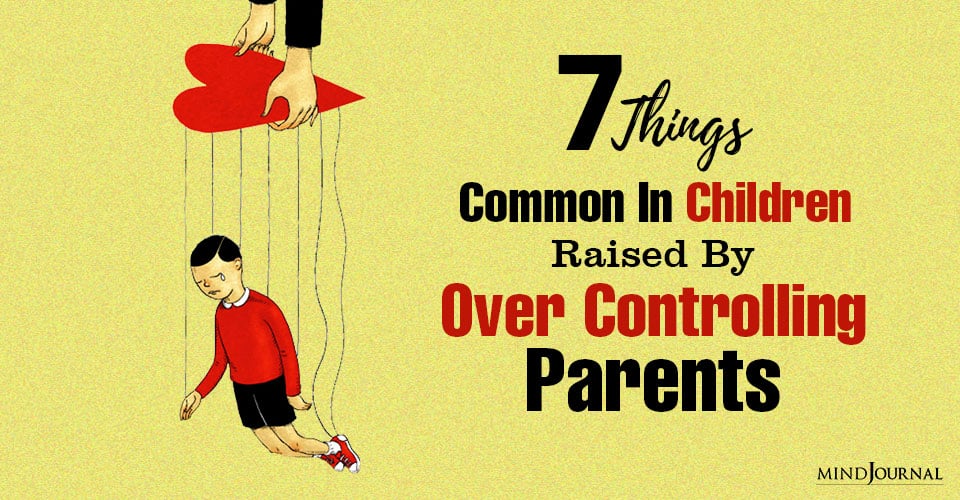If you as a child have had over-controlling parents or another authority figure, the chances are you have developed some personality traits and psychological patterns that make your life more or less difficult.
Over-controlling parents watch a child’s every move, tell them what to do, seek domination, constantly criticize them, teach unhealthy boundaries, have unrealistic or impossible standards and expectations for them, and use active or passive abuse to manipulate them and make them comply.
It’s hard to breathe around such over-controlling parents – both mentally and sometimes even physically.
A child who grows up in such an environment often becomes a neurotic adult.
Because they were under a magnifying glass for so many years, they have learned to adapt and monitor themselves. What was external, at some point got internalized, and such a person learned to treat themselves as their caregivers treated them. Hence now, as adults, they feel the “need” for constant vigilance and self-monitoring.
Read 4 Types Of Parenting Styles In Psychology: What Kind Of A Parent Are You?
7 Things Common In Children Raised by Over Controlling Parents

1. They may feel chronic anxiety or a constant sense of alertness.
Because for most of their lives they, in fact, were in constant danger of being controlled, manipulated, criticized, and punished.
2. They may have developed strong perfectionistic tendencies.
Because such unrealistic standards were inflicted on them.

3. They may tend to control others.
Because they’ve learned that if you want something from the other person, the only way to get it is to manipulate or bully them into it. Also, controlling others gives you a burst of control and power that lets you to briefly escape the psychological state of chronic helplessness.
4. They may be afraid of making mistakes.
Because they constantly were actively or passively punished for it.
Read Are You Raising An Overprotected Child?
5. They may be unenthusiastic, passive and tend to procrastinate.
Because, by being over-controlled for so long, they’ve lost their intrinsic motivation, true self-esteem, and the sense of self-interest.
6. They may be dependent on others.
Because of their learned helplessness and dependency on their controller – or because of their “need” to control others.
7. They may tend to harm themselves and act self-destructively
i.e., to punish themselves for being “bad,” “worthless,” “incompetent,” “lazy,” “stupid,” “selfish,” “imperfect,” and for million other reasons. Because they were constantly harmed and punished – in a physical or mental fashion – and didn’t learn how to love yourself.
The controller, the person who controlled your life, your body, and your mind for many years, is not there anymore.
But if you haven’t processed what happened physically, psychologically and emotionally when you were a child, you still feel and act as if he or she is there. Therefore you tend to compulsively recreate the same emotional and psychological state you were in when you were a child. Either by getting into situations and relationships where there is a power disparity or by over-controlling yourself.
Read 8 Signs You Have Controlling Parents & How To Deal With Them
Psychologically, this pattern serves two purposes:
1. It’s a repetition compulsion that represses the original suffering by indirectly recreating the same situation or dynamic.
2. And it’s a defense mechanism that is “needed” because part of you believes that the danger of a controller is still there.
However, the truth is that these people, who controlled and harmed you when you, in fact, were helpless and dependent, bear no power over you anymore.
This defense that indeed helped you to survive is not needed anymore. The jailer is long gone. The magnifying glass is not there. Nobody is watching you.
Nobody is going to attack, neglect, or abandon you for existing – because you are an adult now. You are not helpless for a long time now. You can finally relax and breathe freely.
The only person who really is in control of your life is …YOU. And you have so much more freedom and options than you realize….
Yes, it’s not that simple. It may take months or years to overcome this psychological pattern. But, as always, the first step is awareness: to become aware if/that you have such a pattern, and why.
Then, it becomes possible to slowly overcome it by doing therapeutic self-work and teaching your body to react differently – all of which leads to healthier self-esteem, psychological freedom, inner serenity, and true happiness.
Read 10 Simple Steps to Stop Toxic Parenting
Did you have over-controlling parents or other authority figures as a child?
What was the most problematic thing you had to deal with regarding people who over-controlled you?
What is the most difficult thing you are dealing with as an adult as a result of being over-controlled in the past?
As always, you are welcomed to share your thoughts and answers in the comment section below or contact me personally.
Have a magnificent day,
Darius
For more on these subjects, please check out the author’s books: Human Development and Trauma: How Childhood Shapes Us into Who We Are as Adults and Self-Work Starter Kit. For more information about Darius, his work, and his contact information please visit selfarcheology.com, and like his Facebook page.
Written by Darius Cikanavicius
Originally appeared in Self-Archeology











Leave a Reply